Case Law Details
Praveg Communications India Limited Vs Commissioner of Central Excise & ST (CESTAT Ahmedabad)
In the present case, the appellant’s activity being of setting-up of stalls for exhibition or events cannot be considered to be classified under Interior Decorator’s service for the reason that there is neither any element of beautification of space nor any provision of advice or consultancy is provided by the appellant. The pattern and design for a stall is as per the layout provided by the customers to the appellant. Therefore, the ingredient to classify the service under Interior Decorator’s service, in the present case is not satisfied hence, the service cannot be classified under Interior Decorator’s service. Moreover, the post Negative List regime, with effect from 01.07.2007, the definition of service was done away and there is only service portion in execution of works contract is listed as a declared service for the purpose of levy of service tax. The appellant’s strong claim is that their service is nothing but Works Contract service.
It is settled law, as per Section 65B of the Finance Act, 1994, Works Contract means a contract wherein transfer of property in goods involved in the execution of such contract is leviable to tax as sale of goods and such contract is for the purpose of carrying out construction, erection, commissioning, installation, completion, fitting out, repair, maintenance, renovation, alteration of any movable or immovable property or for carrying out any other similar activity or a part thereof in relation to such property. In the present case, admittedly the appellant have installed stalls in the exhibition along with material.
With regard to the payment of VAT, the appellant have also submitted VAT Assessment order and VAT return in Form-205 under Section 33 of Gujarat VAT Act, 2003.
From the above documents which are undisputed it is absolutely clear that the appellant have purchased goods and used the same in execution of Works Contract for installation of stalls at exhibition centers. The appellant have also discharged VAT in respect of goods used in execution of Works Contract. In these undisputed facts, the entire activity of the appellant clearly falls under Works Contract service. Accordingly, the service tax at concessional rates discharged as per the Rule 3(1) of Works Contract Rules, 2007 is absolutely correct and legal. Therefore, no demand exists.
In view of the facts as narrated above there is no doubt that the service of the appellant is clearly classified as Works Contract Service. Accordingly, the service tax discharged on the concessional rates under Works Contract Service is correct and legal.
FULL TEXT OF THE CESTAT AHMEDABAD ORDER
The brief facts of the case are that the appellant are engaged in providing exhibition service, event management service, advertisement service, works contract service etc. They have carried out the activity of conceptualizing, designing and execution of stalls as per the customer’s requirement and for the same, the appellant were assigned work orders from the customers viz. Tourism Corporation of Gujarat Limited, Sports Youth and Cultural Activities Department, All India Conference on livestock and Dairy Development etc. The appellant classified the said activity as works contract under Section 65 (105)(zzzza) of the Finance Act, 1994 and availed the benefit of concessional rate of tax under Rule 3(1) of the Works Contract Rules, 2007 and paid service tax at the rate of 4 /8%. An audit was conducted by CERA audit team whereby it was alleged that the appellant classified the services as works contract services however, there was no sale of goods therefore service cannot be classified under works contract service and service tax @ 12.36% should have been paid by the appellant. The investigation and enquiry culminated into the issuance of show cause notice dated 15.11.2017 wherein it was proposed to demand service tax amounting to Rs. 1,06,37,604/- under Section 73(1) of the Finance Act, 1994 along with interest and penalty under Section 75, 76, 77(2) and Section 78 of the Finance Act, 1994 respectively. After considering the reply filed by appellant the learned Commissioner, CGST and CE, Ahmedabad vide order-in-original No. 03/ADC/2020-21 MLM dated 03.06.2020 confirmed the demand of service tax amounting to Rs. 1,06,37,604/- along with interest for delay in making payment of service tax and penalty. Aggrieved by the order-in-original dated 03.06.2020, the appellant preferred the appeal before learned Commissioner (Appeals) however, the learned Commissioner (Appeals) upheld the order-in-original and confirmed the demand along with interest and penalty and rejected the appeal filed by the appellant. Being aggrieved by the said impugned order dated 23.06.2021 the appellant preferred the present appeal before this Tribunal.
2. Shri Jigar Shah, learned Counsel appearing on behalf of the appellant submits that the setting up of exhibition stall is a turnkey project assigned to the appellant which is rightly classified under works contract service and service tax is rightly paid under the Works Contract (Composition Scheme for Payment of Service Tax) Rules, 2007. He submits that turnkey projects were assigned by the customers for designing, making layouts, execution and supervision of temporary structures in compliance of the terms of the agreement. The terms of the agreement made it clear that the appellant have to undertake all the activities mentioned therein under instructions of the Professional Advisor and the Director General, SAG representative. It was a consolidated work undertaken by the appellant which was inclusive of service as well as the materials required for the preparation of the stall. The materials such as cloth, plywood, nut, bolts, flags etc. which are used in the setup of the stall are subject to the approval of the Director General, SAG Engineer. The property in goods of the material gets transferred to the customers. Hence, the appellant has rightly classified the activity under ‘works contract service’. The VAT returns filed by the appellant during the impugned period also makes it abundantly clear that there is supply of both service and goods in the present case. He further submits that it is settled law that a contract that provide for the supply of goods as well as labour would a works contract and to the extent the property in goods actually passes from the contractor to the principal, the transaction would come within the purview of the extended definition of sale namely transfer of property in goods whether as goods or in some other form. This is the position after the Constitution (46th Amendment) Act, 1982 whereby the legislatures of the States were empowered to levy sales tax on certain transactions described in Article 366 (29A) of the Constitution of India. This position has been confirmed by Hon’ble Supreme Court in the case of Bharat Sanchar Nigam Limited vs. UOI – 2006 (3) SCC 1 wherein it was held by the Hon’ble Apex Court that the bifurcation of an activity into sale and service is permissible in the case of works contracts.
2.1 He further submits that Works Contract Composition Scheme Rules, 2007 were notified by the Legislature vide Notification No. 32/2007-ST dated 22.05.2007 providing the option to a taxable person towards determination and payment of its liability for works contract service on composition basis. He submits that the appellant have opted for the composition scheme prior to payment of service tax and benefit of composition scheme was availed throughout the period of ongoing contract and in terms of Rule 3(3), the composition scheme granted the option to pay service tax at the rate of 2% upto 28.02.2008 and from 01.03.2008 onwards, at the rate of 4% on the total value of the works contract. However, the condition was that the appellant must not have paid the service tax under other category. He submits that in terms of Rule 3(1) of Works Contract Rules, 2007 which is over-riding effect of the provisions of Section 67 of the Act and Rule 2A of the Determination of Value Rules. Therefore, for the same reason they availed the benefit of Composition Scheme. He placed reliance on the Hon’ble Apex Court judgment in the case of CCE vs. Larsen & Toubro Limited – 2015 (39) STR 913 (SC). He submits that learned Commissioner (Appeals) rejected the classification as ‘works contract service’ on the grounds that mere production of purchase bill does not support the ownership of the said goods were transferred. He submits that Commissioner has not considered the VAT returns submitted by the appellant towards sale of goods used in execution of works contract. He submits that show cause notice as well as the impugned order accepted that on or before 01.07.2012 the activity carried out by the appellant shall qualify under works contract service but after the period 01.07.2012 the activity carried out by the appellant shall fall under interior decorator despite the fact that appellant have not changed their scope of work then how the activity carried out by the appellant can change.
2.2 He further submits that demand of service tax under the category of taxable service under Section 65B(41) of the Finance Act, 1994 @ 12.36% is bad in law as the appellant is not engaged in providing service simpliciter in terms of Finance Act, 1994. It is his submission that pursuant to enactment of the Negative List regime with effect from 01.07.2012, all services provided from one person to another against consideration except those covered under Negative List, exclusion or exemption, were leviable to service tax. Under the Negative List regime, the service portion in execution of works contract has been listed as a declared service under Section 66E of Finance Act, 1994. He submits that the appellant are engaged in providing works contract service to their customers. The nature of their service has remained unchanged in the Negative List regime as per amended Rule 2A of Service Tax Rules, 2006. The appellant have been discharging service tax at the applicable rates (i.e. 12.36% on 40% of taxable value of the contract) since 01.07.2012 onwards.
2.3 Learned Counsel further submits that demand of service tax under ‘Interior Decorator Service’ is wholly incorrect and bad in law. He submits that in the present case, the ingredients provided for defining Interior Decorator service are not satisfied inasmuch as the primary ingredient of ‘Interior Decorator Service’ is the provision of service by way of advice, consultancy, technical assistance or in any other manner to the service recipients coupled with planning, designing or beautification of spaces. He submits that setting-up of stalls for exhibition or events cannot be considered to classify ‘Interior Decorator Service’. The work undertaken by the appellant, by no stretch of imagination can be considered to be ‘Interior Decorator Service’. It is merely a setup of stall as per the design and approval of the customers. There is neither any element of beautification of space involved nor any provision of advice, consultancy that is provided by the appellant. Every pattern and design for a stall is as per the layout which is provided by the customer to the appellant. The activity undertaken by the appellant is simply a works contract service since there is both labour and use of material as part of the contract and the property in goods gets transferred in favour of the customers. He placed reliance on the judgment in the case of R Nagendra Rao vs. CCE – 2018-TIOL-3280-CESTAT-MAD.
2.4 As regards the allegation in the show cause notice as to provision of tangible goods service he submits that it is supply of tangible goods service is completely baseless and not sustainable in law. There is no substantial basis to conclude that the appellant provided supply of tangible goods service. It has been arbitrarily concluded merely on the basis of the nomenclature used in the invoices issued by the appellant that the appellant are mainly providing Interior Decorator Service as the main service and the supply of tangible goods service is incidental or ancillary service. He submits that certain conditions are required to be satisfied in order to determine whether a transaction amounts to a ‘transfer of right to use goods’ which has not been satisfied. Therefore, classification ‘supply of tangible goods service’ is devoid of legal merits. He further submits that principle of bundled service has been incorrectly invoked in the present case. Without prejudice, he further submits that the demand under a wrong heading of service itself vitiates the proceedings and the impugned order. Since the service is not classifiable as ‘Interior Decorator’s Service’ even if the service is not classifiable as Works Contract, the demand cannot be sustained as held in the following judgment:-
(a) AT & Co. vs. CCE – 2017 (49) STR 574 (T)
(b) CCE vs. H.M. Satyanarayan Engineers and Contractors – 2018 TIOL 2676-CESTAT MUM
(c) CCE vs. Zenith Punjab Rollers Pvt. Limited – 2018-TIOL-2524-CESTAT CHD
(d) Crescent Organics Pvt. Limited vs. CCE – 2016 (46) S.T.R. 470 (T)
(e) DSP Merrill Lynch Limited vs. CST, 2016 (44) S.T.R. 436 (T)
2.5 Without prejudice he also submits that the demand of service tax Interior Decorator Service is not sustainable as there is mechanism to ascertain the value of service component in the facts of the present case. He takes support of the following judgments:-
(a) Commissioner of Central Excise & Customs, Kerala & Ors vs. Larsen & Toubro Limited & Ors – 2015 (39) STR 913 (SC)
(b) Suresh Kumar Bansal vs. UOI – 2016 (43) STR 3 (Del.)
He further submits that the demand was raised on the basis of definition of services in erstwhile regime which are not relevant in negative list based service tax regime. For this reason also service tax demand on the classification of service under Interior Decorator’s Service is not sustainable.
2.6 He also submits that there is no suppression of facts since the department was well aware of the facts hence invocation of extended period of limitation is wholly incorrect. He relied upon following decisions:-
(a) CCE vs. Vineet Electrical, 2002 (144) ELT A292 (SC)
(b) CCE vs. Raptakos Brett, 2006 (194) ELT 101 (T)
(c) CCE vs. Rishabh Velveleen, 1999 (114) ELT 839 (T)
(d) Pee Jay Apparels vs. CCE, 2001 (135) ELT 842 (T)
(e) Cosmic Dye Chemical vs. CCE, 1995 (75) ELT 721 (SC)
He further submits that extended period of limitation was also not applicable since the issue involves interpretation of law. He takes support of the following judgments:-
(a) Ispat Industries Limited vs. CCE – 2006 (199) ELT 509 (Tri.-Mum)
(b) NIRC Limited vs. CCE – 2007 (209) ELT 22 (Tri.-Del.)
(c) Chemicals & Fibres of India Limited vs. CCE 1988 (33) ELT 551 (Tri.)
(d) Homa Engineering Works vs. Commissioner of C. Ex., Mumbai – 2007 (7) STR 546 (Tri-Mum)
(e) Jaihind Projects Limited vs. CCE – [2010] 25 STT 196 (Tri-Ahmedabad)
3. Shri Prakash Kumar Singh, learned Superintendent (AR) appearing on behalf of the Revenue reiterates the findings of the impugned order.
4. We have carefully considered the submissions made by both the sides and perused the record. We find that Adjudicating Authority has confirmed the demand of service tax on the activity of the appellant treating as ‘Interior Decorator’s Service’. For ease of reference, definition of ‘Interior Decorator’s Service’ which was prevailing prior to 01.07.2012 under Section 65(59) of the Finance Act, 1994 reads as under:-
“‘Interior Decorator’ means any person engaged, whether directly or indirectly, in the business of providing by way of advice, consultancy, technical assistance or in any other manner, services related to planning, design or beautification of spaces, whether manmade or otherwise and includes a landscape designer.”
Section 65(105)(q) of the erstwhile Finance Act, 1994 defines taxable service of ‘Interior Decorator’s Service’ as under:-
“(q) “taxable service” means any service provided or to be provided to any person, by an interior decorator in relation to planning, design or beautification of spaces, whether man-made or otherwise, in any manner.”
In order to classify the service under Interior Decorator service the following ingredients are to be satisfied:-
(i) Providing by way of advice, consultancy, technical assistance or in any other manner.
(ii) Services related to planning, design or beautification of spaces
(iii) whether man-made or otherwise
(iv) includes a landscape designer
As stated above, the primary ingredient of Interior Decorator’s service is the provision of service by way of advice, consultancy and technical assistance or in any other manner to the service recipients coupled with planning, designing or beautification of spaces.
5. In the present case, the appellant’s activity being of setting-up of stalls for exhibition or events cannot be considered to be classified under Interior Decorator’s service for the reason that there is neither any element of beautification of space nor any provision of advice or consultancy is provided by the appellant. The pattern and design for a stall is as per the layout provided by the customers to the appellant. Therefore, the ingredient to classify the service under Interior Decorator’s service, in the present case is not satisfied hence, the service cannot be classified under Interior Decorator’s service. Moreover, the post Negative List regime, with effect from 01.07.2007, the definition of service was done away and there is only service portion in execution of works contract is listed as a declared service for the purpose of levy of service tax. The appellant’s strong claim is that their service is nothing but Works Contract service. In this regard post 01.07.2012, the Works Contract service has been specified as declared service under Section 66E as under:-
“66E. The following shall constitute declared services, namely:
(h) service portion in the execution of a works contract;
………….”
The Works Contract Composition Scheme Rules, 2007 were notified vide Notification No. 32/2007-ST dated 22.05.2007 providing the option to a taxable person towards determination and payment its liability for works contract service on composition basis. The said Notification No. 32/3007-ST dated 22.05.2007 reads as under:-
Works Contract (Composition Scheme for Payment of Service Tax) Rules, 2007
In exercise of the powers conferred by sections 93 and 94 of the Finance Act, 1994 (32 of 1994), the Central Government hereby makes the following rules, namely :-
1. Short title and commencement. – (1) These rules may be called the Works Contract (Composition Scheme for Payment of Service Tax) Rules, 2007.
(2) They shall come into force with effect from the 1st day of June, 2007.
2. Definitions. – In these rules, unless the context otherwise requires, –
(a) “Act” means the Finance Act, 1994 (32 of 1994);
(b) “section” means the section of the Act;
(c) “works contract service” means services provided in relation to the execution of a works contract referred to in sub-clause (zzzza) of clause (105) of section 65 of the Act;
(d) words and expressions used in these rules and not defined but defined in the Act shall have the meanings respectively assigned to them in the Act.
3.(1) Notwithstanding anything contained in section 67 of the Act and rule 2A of the Service (Determination of Value) Rules, 2006, the person liable to pay service tax in relation to works contract service shall have the option to discharge his service tax liability on the works contract service provided or to be provided, instead of paying service tax at the rate specified in section 66 of the Act, by paying an amount equivalent to two per cent. of the gross amount charged for the works contract.
Explanation. – For the purposes of this rule, gross amount charged for the works contract shall not include Value Added Tax (VAT) or sales tax, as the case may be, paid on transfer of property in goods involved in the execution of the said works contract.
(2) The provider of taxable service shall not take CENVAT credit of duties or cess paid on any inputs, used in or in relation to the said works contract, under the provisions of CENVAT Credit Rules, 2004.
(3) The provider of taxable service who opts to pay service tax under these rules shall exercise such option in respect of a works contract prior to payment of service tax in respect of the said works contract and the option so exercised shall be applicable for the entire works contract and shall not be withdrawn until the completion of the said works contract.
[Notification No. 32/2007-S.T., dated 22-5-2007]
6. It is settled law, as per Section 65B of the Finance Act, 1994, Works Contract means a contract wherein transfer of property in goods involved in the execution of such contract is leviable to tax as sale of goods and such contract is for the purpose of carrying out construction, erection, commissioning, installation, completion, fitting out, repair, maintenance, renovation, alteration of any movable or immovable property or for carrying out any other similar activity or a part thereof in relation to such property. In the present case, admittedly the appellant have installed stalls in the exhibition along with material. In this regard the appellant have submitted invoices of the material purchased for use in the execution of contract. Some sample invoices are scanned below:-
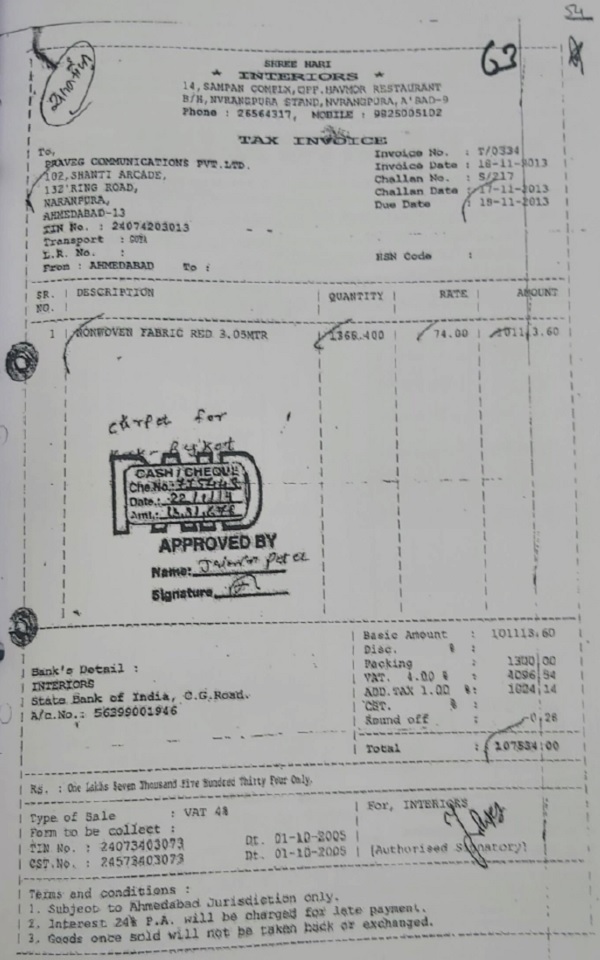
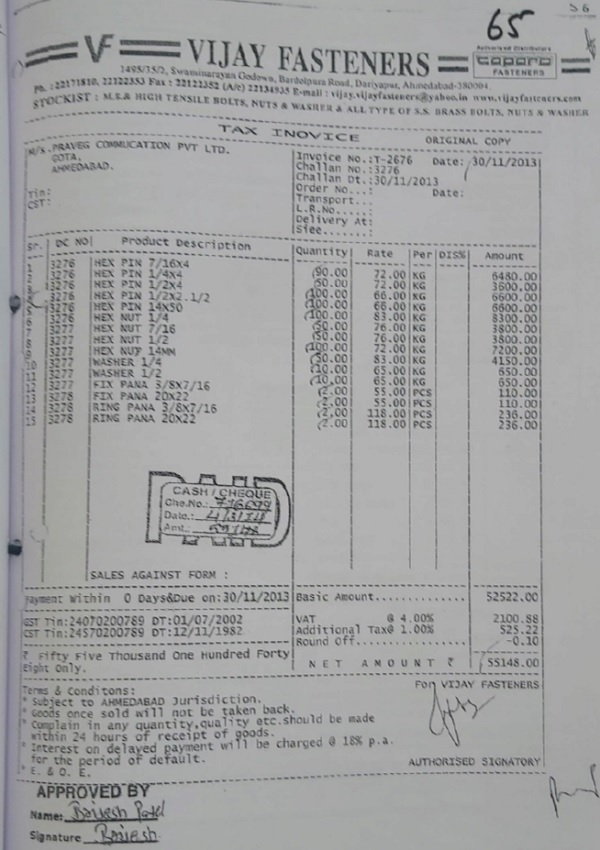
In respect of bought-out material used for execution of the contract, the appellant have also discharged State VAT. The sample copies of receipt of VAT payment are scanned below:-
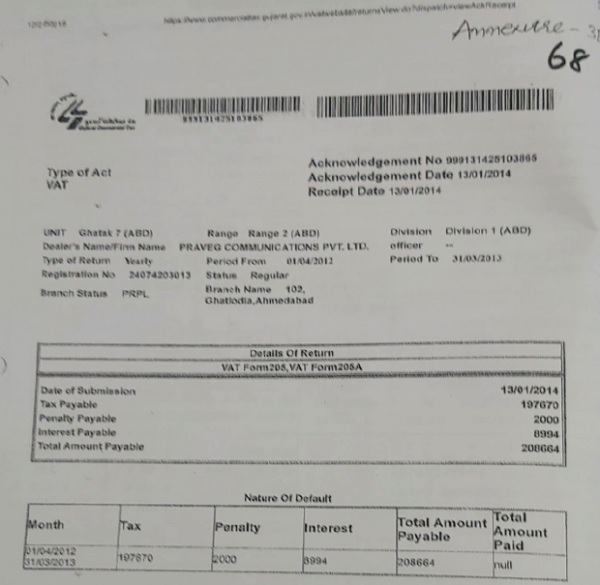
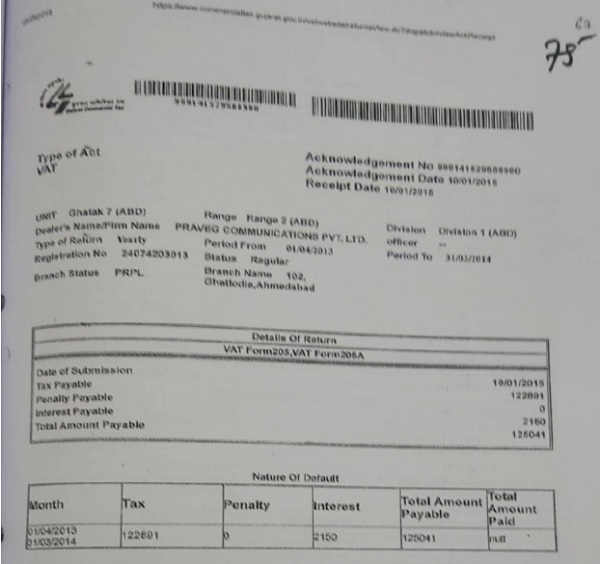
With regard to the payment of VAT, the appellant have also submitted VAT return in Form-205 under Section 33 of Gujarat VAT Act, 2003. One sample copy of such Form-205 is scanned below:-
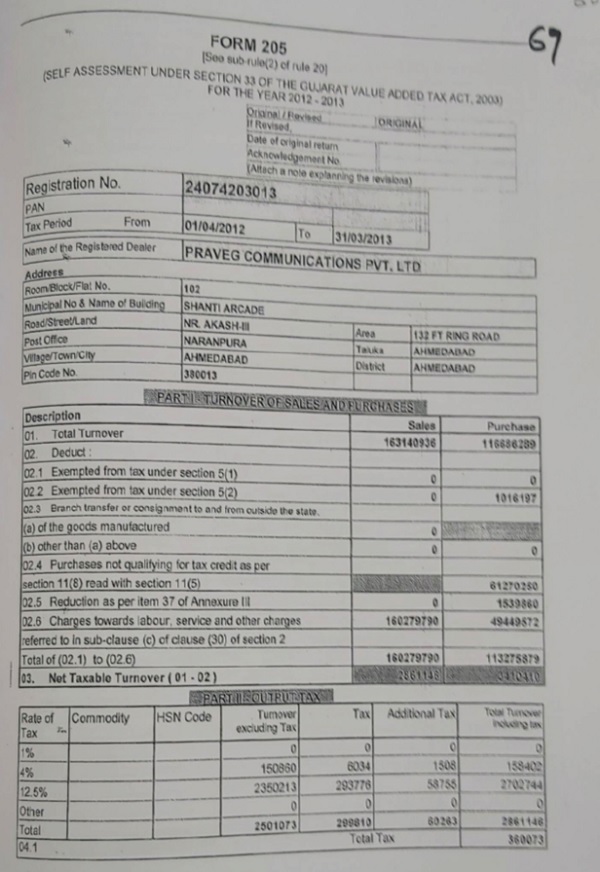
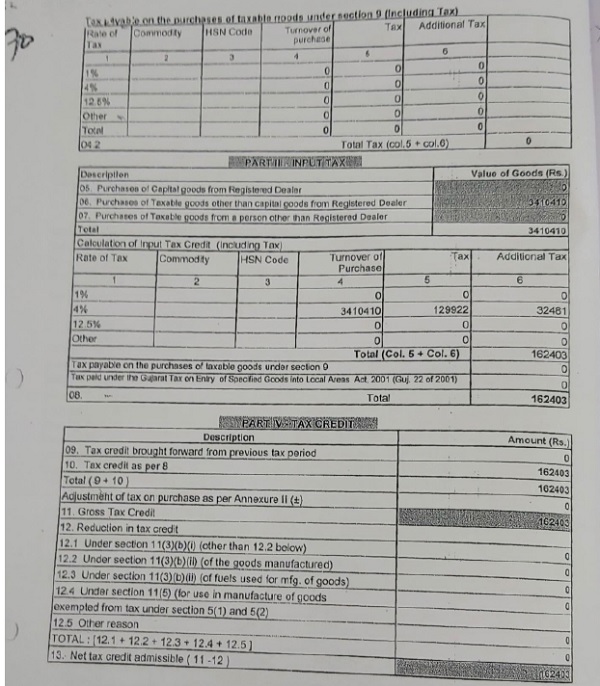
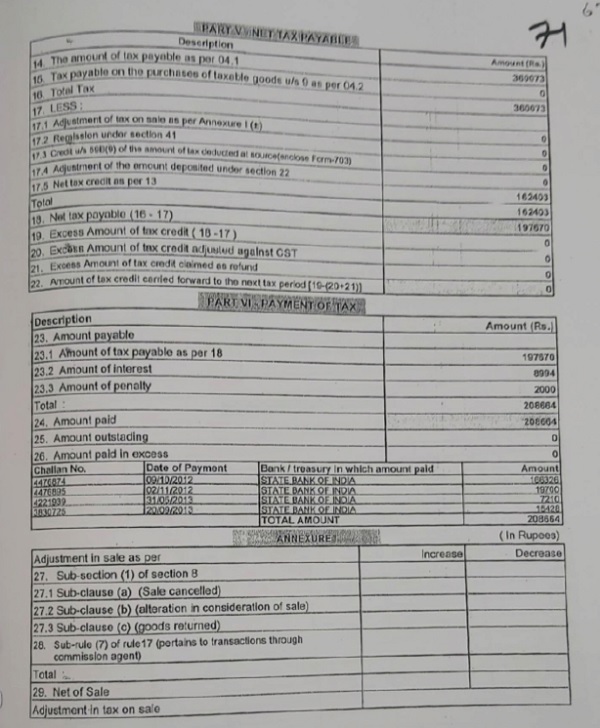
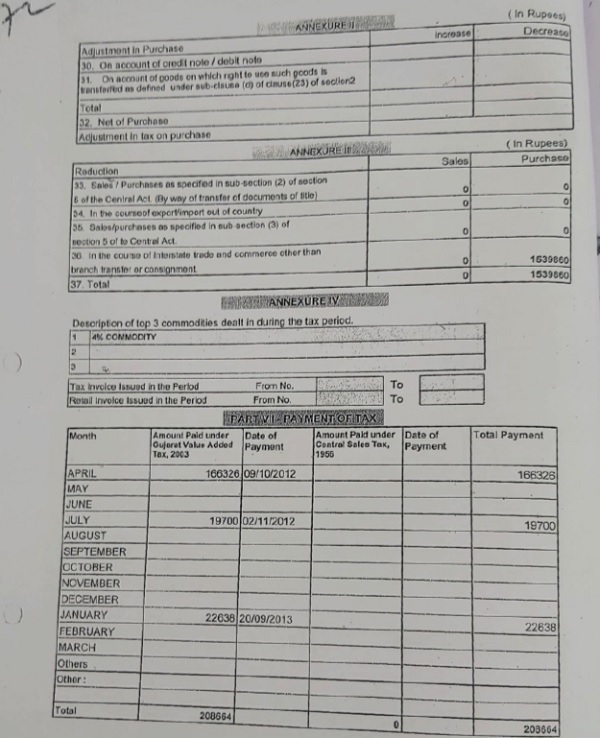

The appellant have also submitted VAT assessment order. The copy of the same is scanned below:-
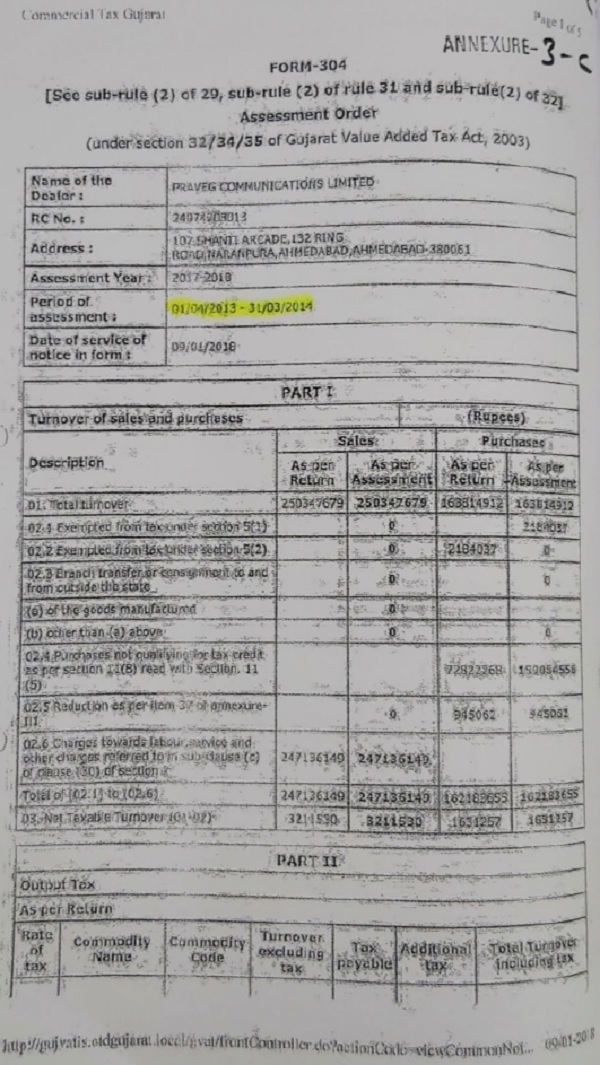
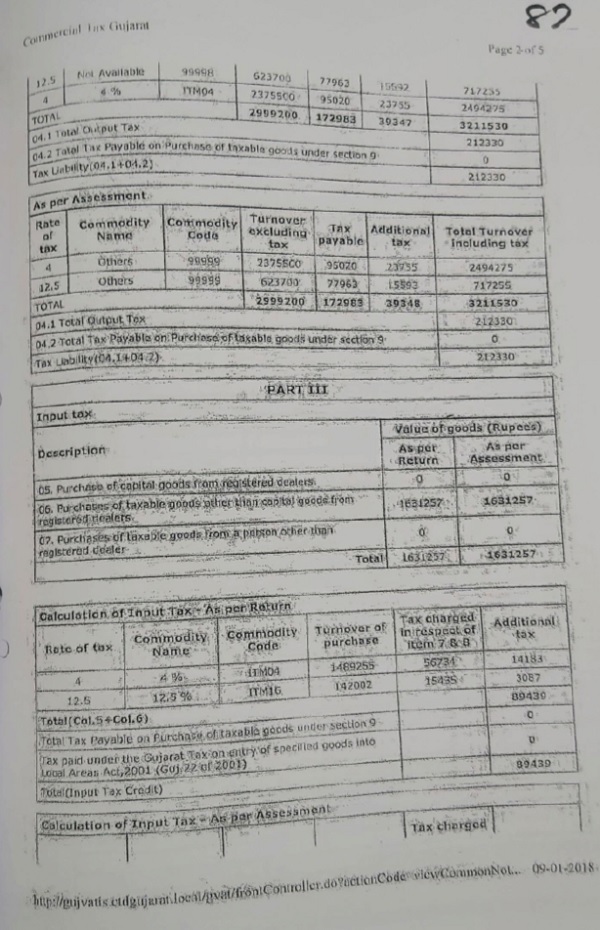
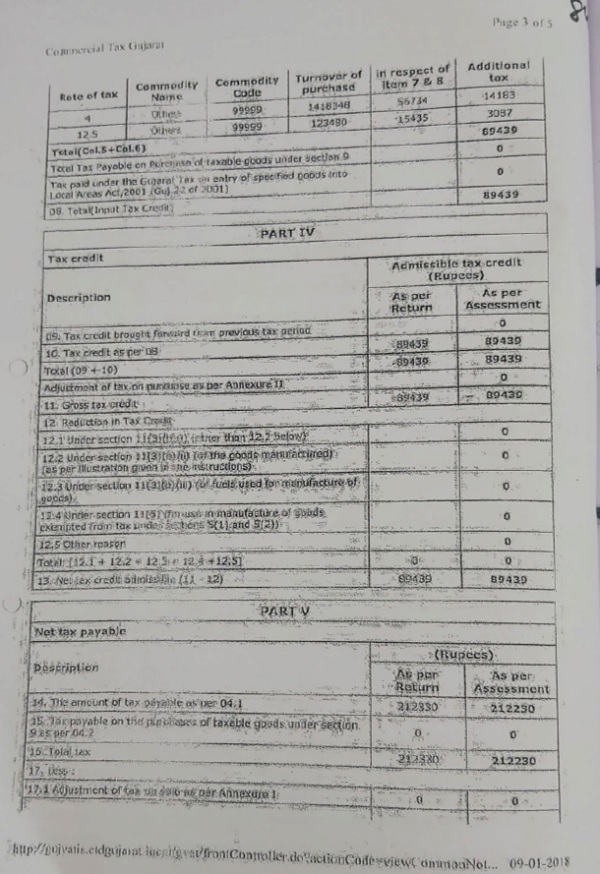
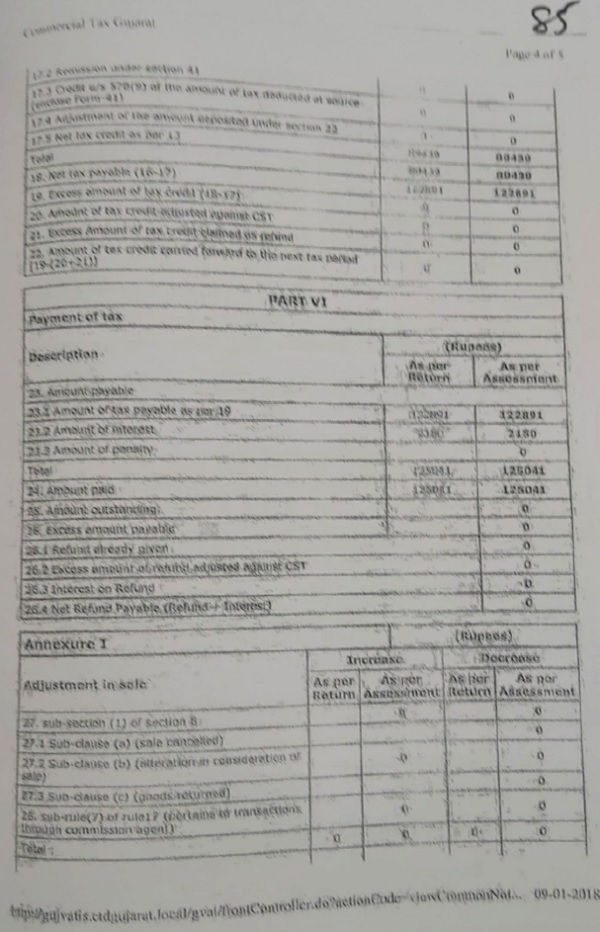
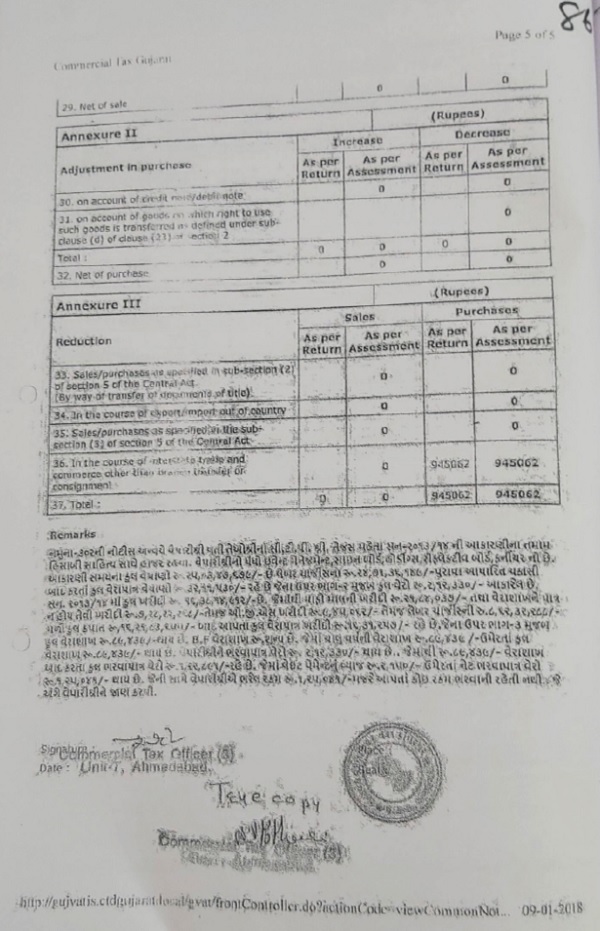
The appellant have also submitted Chartered Accountant certificate showing purchase of material and sale thereof:-
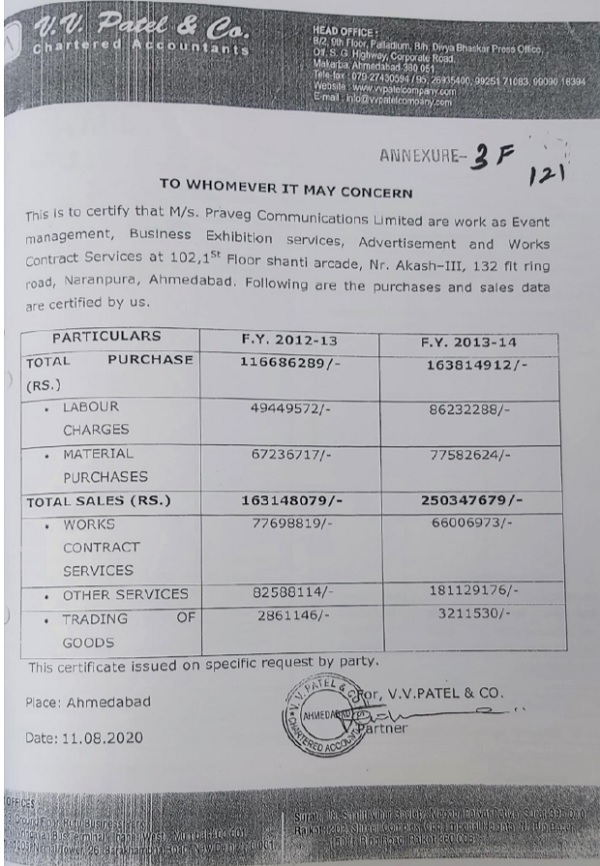
7. From the above documents which are undisputed it is absolutely clear that the appellant have purchased goods and used the same in execution of Works Contract for installation of stalls at exhibition centers. The appellant have also discharged VAT in respect of goods used in execution of Works Contract. In these undisputed facts, the entire activity of the appellant clearly falls under Works Contract service. Accordingly, the service tax at concessional rates discharged as per the Rule 3(1) of Works Contract Rules, 2007 is absolutely correct and legal. Therefore, no demand exists. This issue has been considered by the Hon’ble Supreme Court in the case of Total Environment Building Systems Pvt. Limited which is affirmed by Hon’ble Supreme Court in the case of CCE vs. Larsen & Toubro Limited – 2015 (39) STR 913 (SC). The Hon’ble Supreme Court in the case of Total Environment Building Systems Pvt. Limited (supra) decided the matter as under:-
“19. Before proceeding to consider the aforesaid rival contentions, it would be useful to discuss the evolution, meaning and content of the expression works contract in the context of sales tax law and as well as under the service tax regime. This is, having regard to the definition of works contract being inserted w.e.f. 1st June, 2007 to the Finance Act, 1994 which seeks to impose service tax on the service aspect of a works contract. The reason for this exercise is because works contract by itself is not taxable. A works contract as defined by the amendment has two components, namely, a sale component and a service component. It is only when both the components are satisfied and co-exist that a contract becomes a works contract as defined. Further, it is only on the service component of the works contract that the service tax is leviable w.e.f. 1st June, 2007. As far as the sale component in a works contract is concerned, the Sales Tax laws of the respective States would apply. It is also necessary to state that after the enforcement of the Central Goods and Services Tax Act (CGST), 2017 regime the matter is covered under that Act. Therefore, it is necessary to gather the meaning of works contract from judicial precedent in order to answer the rival submissions in the instant case.
Section 65(105)(zzzza) of the Finance Act, 1994 as amended by the Finance Act, 2007
which defines work contract, has been extracted as under, for ease of reference :
“ ‘Works contract’ means a contract wherein, –
transfer of property in goods involved in the execution of such contract is leviable to tax as sale of goods, and such contract is for the purposes of (ii) carrying out, –
(a) erection, commissioning or installation of plant, machinery, equipment or structures, whether pre-fabricated or otherwise, installation of electrical and electronic devices, plumbing, drain laying or other installations for transport of fluids, heating, ventilation or air-conditioning including related pipe work, duct work and sheet metal work, thermal insulation, sound insulation, fire proofing or water proofing, lift and escalator, fire escape staircases or elevators; or
(b) construction of a new building or a civil structure or a part thereof, or of a pipeline or conduit, primarily for the purposes of commerce or industry; or
(c) construction of a new residential complex or a part thereof; or
(d) completion and finishing services, repair, alteration, renovation or restoration of, or similar services, in relation to (b) and (c); or
(e) turnkey projects including engineering, procurement and construction or commissioning (EPC) projects.”
A reading of the aforesaid definition would indicate that two requisites must be satisfied before service tax on works contract could be levied. In other words, a contract in order to be works contract must involve :
“(i) transfer of property in goods involved in the execution of such contract is leviable to tax as sale of goods, and
(ii) such contract is for the purposes of carrying out, –
(a) erection, commissioning or installation of plant, machinery, equipment or structures, whether pre-fabricated or otherwise, installation of electrical and electronic devices, plumbing, drain laying or other installations for transport of fluids, heating, ventilation or air-conditioning including related pipe work, duct work and sheet metal work, thermal insulation, sound insulation, fire proofing or water proofing, lift and escalator, fire escape staircases or elevators; or
(b) construction of a new building or a civil structure or a part thereof, or of a pipeline or conduit, primarily for the purposes of commerce or industry; or
(c) construction of a new residential complex or a part thereof; or
(d) completion and finishing services, repair, alteration, renovation or restoration of, or similar services, in relation to (b) and (c); or
(e) turnkey projects including engineering, procurement and construction or commissioning (EPC) projects.”
Thus, works contract has two essential components: firstly, sale of goods involved in the execution of such contracts which would attract Sales Tax or Value Added Tax (VAT) as the case may be, i.e., prior to the enforcement of the Goods and Services Tax regime and secondly, a service component which is specified in clause (ii)(a)-(e) of the definition of works contract which would attract Service Tax under the provisions of the Finance Act, 1994 as amended in the year 2007. If both the above requisites are present, then Service Tax on works contract is leviable on the service component. This is clear from the use of the word “and” between components (i) and (ii) of the definition of works contract under Clause (zzzza) of Section 65 of the Finance Act, 1994 which is as per the amendment in the year 2007. Thus, the definition speaks of a composite works contract comprising of an element of sale and an element of service.
Having regard to the specific definition of works contract introduced in the Finance Act, 1994, w.e.f. 1st June, 2007 and bearing in mind that both clauses (i) as well as (ii) of the definition have to be satisfied before the levy of service tax on the service component of a works contract, it is necessary to understand the scope and ambit of the expression “transfer of property in goods” in clause (i) of the definition of works contract from various judgments of this Court. Further, sales tax/VAT could also be levied on such transfer of goods involved in the execution of such contracts and a service tax on as specified in clause (ii) of the definition of works contract.
The evolution of the concept of works contract is noted as under as it is on the service component of such contract that service tax is leviable. The reference to judgments on works contract under Sales Tax law would be pertinent.
(A) Prior to the 46th Amendment of the Constitution, levy of sales tax on sale of goods involved in the execution of a works contract was held to be unconstitutional in Gannon Dunkerley (I) – State of Madras v. Gannon Dunkerley and Co. (Madras) Ltd. [AIR 1958 SC 560]; [1959 SCR 379]. A Constitution Bench of this Court held that in a building contract where the agreement between the parties was that the contractor should construct the building according to the specifications contained in the agreement and in consideration, received payment as provided therein, there was neither a contract to sell the materials used in the construction nor the property passed therein as movables. It was held that in the building contract which was one (entire and indivisible), there was no sale of goods and it was not within the competence of the concerned provincial State Legislature (Madras Legislature) to impose tax on the supply of the materials used in such a contract treating it as a sale. Consequently, it was held that in a building contract which was one, entirely indivisible, there was no sale of goods and it was not within the competence of the Provincial State Legislature to impose tax on the supply of materials used in such a contract treating it as a sale. This was on the premise that the works contract was a composite contract which is inseparable and indivisible.
(B) As a result of this dictum, the Law Commission of India in its 61st Report specifically examined the taxability of works contract and examined the particular question whether the power to tax indivisible contract of works should be conferred on the States. This led to insertion of Clause (29A) to Article 366 of the Constitution. For ease of reference, the same is extracted as under :
“Article Definitions. 366. – In this Constitution, unless the context otherwise requires, the following expressions have the meanings hereby respectively assigned to them, that is to say –
“tax on the sale or purchase of goods” [(29A) includes –
(a) xx xx xx
(b) A tax on the transfer of property in goods (whether as goods or in some other form) involved in the execution of a works contract;”
(C) In Gannon Dunkerley (II) – Gannon Dunkerley and Co. v. State of Rajasthan [1993 (1) SCC 364], the Constitution Bench of this Court explained the effect of the legal fiction introduced by sub-clause (b) of Clause (29A) of Article 366 of the Constitution. The following principles were enunciated, to outline the operation of sub-clause (b) of Clause (29A) of Article 366 :
(a) That by virtue of the legal fiction in Clause 29A, even in a single indivisible works contract, there is a deemed sale of goods and such sale has all the incidents of ‘sale of goods.’
(b) That the value of goods involved in the execution of a works contract may be determined by taking into account the value of the entire works contract and deducting therefrom, the charges towards labour and services.
(c) That the following charges towards labour and services were to be excluded in determining the value of goods sold in executing a works contract :
(i) Labour charges for execution of the works;
(ii) Amount paid to a sub-contractor for labour and services;
(iii) Charges for planning, designing and architect’s fees;
(iv) Charges for obtaining on hire or otherwise machinery and tools used for the execution of the works contract;
(v) Cost of consumables such as water, electricity, fuel, etc. used in the execution of the works contract the property in which is not transferred in the course of execution of a works contract; and
(vi) Cost of establishment of the contractor to the extent it is relatable to supply of labour and services;
(vii) Other similar expenses relatable to supply of labour and services;
(viii) Profit earned by the contractor to the extent it is relatable to supply of labour and services.
(D) Therefore, under the regime that existed prior to the amendment and insertion of Clause (29A) to Article 366 of the Constitution, a typical works contract would not involve sale of goods and no sales tax was leviable on such works contract. However, subsequently, by way of the Constitution (Forty-sixth Amendment) Act, 1982, Clause (29A) came to be inserted into Article 366 of the Constitution of India, providing for an inclusive definition of the expression “tax on the sale or purchase of goods” in relation to various transactions and dealings including “tax on the transfer of property in goods (whether as goods or in some other form) involved in the execution of a works contract.”
(E) Following the introduction of the said clause, most States amended their Sales Tax statutes to cover ‘works contract.’ The Constitutional validity of the aforementioned provisions by which the legislatures of the States were empowered to levy sales tax on certain transactions described in sub-clauses (a) to (f) of Clause (29A) of Article 366 of the Constitution as also the question, whether, the power of the State legislature to levy tax on the transfer of property in goods involved in the execution of works contract is subject to the restrictions and conditions contained in Article 286 of the Constitution, were considered by a Constitution Bench of this Court in Builders Association of India v. Union of India [(1989) 2 SCC 645]. Therein, while upholding the constitutional validity of the aforementioned provisions, the Constitution Bench explained the unique features of a composite contract relating to work and materials and expounded on the meaning, effect and amplitude as also contours of the provisions pertaining to the taxing power of the States in relation to works contract particularly in paragraphs 38-40 of the judgment.
(F) In light of the said discussion, this Court concluded that the transfer of any goods in sub-clauses (a) to (f) of Clause (29A) of Article 366 of the Constitution is by way of a deeming provision i.e., a deemed sale. This Court however, cautioned that the levy of sales tax after the 46th Amendment to the Constitution of India has to still comply with the restrictions imposed under Articles 286 and 269 of the Constitution.
(G) Later a three-judge Bench of this Court in State of A.P. v. Kone Elevators [(2005) 3 SCC 389 = 2005 (181) E.L.T. 156 (S.C.)] had taken the view that a contract for manufacture, supply and installation of lifts is a “sale” and the entire value of the consideration can therefore be taxed under the sales tax law. However, the matter was subsequently referred to a Larger Bench to review the issue afresh. This Court, on rehearing the matter referred to it, in Kone Elevator India Pvt. Ltd. v. State of Tamil Nadu [(2014) 7 SCC 1 = 2014 (34) S.T.R. 641 (S.C.) = 2014 (304) E.L.T. 161 (S.C.)], observed that the installation obligation in a contract for manufacture, supply and installation of lift is not merely incidental, but was a profound part of the entire contract. That various components were assembled together and installed at site as a permanent fixture to the building. The goods, skill and labour elements are intimately connected with one another and the contract is not divisible. Therefore, this Court concluded that a contract for manufacture, supply and installation of lifts was a works contract. It was also observed that even after the 46th Amendment, if Article 366(29A)(b) is to be invoked, as a necessary concomitant, it must be shown that the terms of the contract would lead to a conclusion that it is a ‘Works Contract’. In other words, unless a contract is proved to be a ‘Works Contract’ by virtue of the terms agreed to as between the parties, invocation of Article 366(29A)(b) of the Constitution, cannot be made. That in circumstances when no definite conclusion can be made to the effect that a given contract is a works contract, the same will have to be declared as a ‘sale’ attracting the provisions of the relevant sales tax enactments.
(H) In the case of Bharat Sanchar Nigam Ltd. v. Union of India [2006] 145 STC 91 (SC) = 2006 (2) S.T.R. 161 (S.C), the question that came up for decision before this Court was with regard to the nature of the transaction by which mobile phone connections were obtained, as to, whether, it is a sale or a service or both. This Court held that providing a telephone connection which operates by transmission of electromagnetic waves or radio frequencies are not ‘goods’ for the purpose of Article 366(29A) of the Constitution and that the goods in telecommunication are limited to the handsets supplied by the service provider and as far as the SIM cards are concerned, the issue was left for determination by the assessing authorities.
(I) Subsequently, in Larsen and Toubro Limited and Another v. State of Karnataka and Another [(2014) (1) SCC 708], this Court deciphered the meaning of the works contract from the earlier judgments and in para 72 opined as under :-
In our opinion, the term “works contract” in “72. Article 366(29A)(b) is amply wide and cannot be confined to a particular understanding of the term or to a particular form. The term encompasses a wide range and many varieties of contract. Parliament had such wide meaning of “works contract” in its view at the time of the Forty-sixth Amendment. The object of insertion of clause (29A) in Article 366 was to enlarge the scope of the expression “tax on sale or purchase of goods” and overcome Gannon Dunkerley (1) [State of Madras v. Gannon Dunkerley and Co. (Madras) Ltd., AIR 1958 SC 560 : 1959 SCR 379]. Seen thus, even if in a contract, besides the obligations of supply of goods and materials and performance of labour and services, some additional obligations are imposed, such contract does not cease to be works contract. The additional obligations in the contract would not alter the nature of contract so long as the contract provides for a contract for works and satisfies the primary description of works contract. Once the characteristics or elements of works contract are satisfied in a contract then irrespective of additional obligations, such contract would be covered by the term “works contract”. Nothing in Article 366(29A)(b) limits the term “works contract” to contract for labour and service only. The Learned Advocate General for Maharashtra was right in his submission that the term “works contract” cannot be confined to a contract to provide labour and services but is a contract for undertaking or bringing into existence some “works”. We are also in agreement with the submission of Mr. K.N. Bhat that the term “works contract” in Article 366(29A)(b) takes within its fold all genre of works contract and is not restricted to one species of contract to provide for labour and services alone. Parliament had all genre of works contract in view when clause (29A) was inserted in Article 366.”
(Underlining by me)
(J) Further, the difference between a contract for work (or service) and a contract for sale (of goods) was considered and by placing reliance on Commissioner of Sales Tax v. Purshottam Premji [(1970) 2 SCC 287], it was observed that the primary difference between a contract for work (or service) and a contract for sale of goods is that, in the former, there is in the person performing work or rendering service no property in the thing produced as a whole, notwithstanding that a part or even the whole of the materials used by him may have been his property. In the case of a contract for sale, the thing produced as a whole has individual existence as a sole property of the party who produced it, at some time before delivery, and the property therein passes only under the contract relating thereto to other party for a price. It was also observed that the factors highlighted to distinguish a contract for work from a contract for sale are relevant but not exhaustive.
(K) In paragraph 89 of the Larsen and Toubro Limited and Another (supra) this Court observed that three conditions must be fulfilled to sustain the levy of tax on the goods deemed to have been sold in execution of the works contract, namely, (i) there must be a works contract, (ii) the goods should have been involved in the execution of the works contract, and (iii) the property in those goods must be transferred to a third party either as goods or in some other form. In a building contract or any contract to do construction, the above three things are fully met. In a contract to build up a flat there will necessarily be a sale of goods element. Works contract also includes building contracts and, therefore, it can be stated that building contracts are a species of works contract.
(L) With reference to the aspect theory, it was held that though the State Legislature does not have the power to tax services by including the cost of such service in the value of goods but that does not detract the State to tax the sale of goods element involved in the execution of works contract in a composite contract like contract for construction of building and sale of a flat therein. In light of the above discussion, the legal proposition was summarised in paragraph 97 of the judgment.
Evolution of the practice in relation to the levy of service tax on works contract :
20. Service tax was introduced in India vide the Finance Act, 1994. Service tax is legislated by Parliament under the residuary entry i.e. Entry 97 of List I of the Seventh Schedule of the Constitution of India read with Article 248 of the Constitution. The service tax provisions have the following basic scheme :
(i) Section 65 of the Act provides for taxable services;
(ii) Section 66 of the Act provides for the charge of service tax by the person designated as “the person responsible for collecting the service tax” for the Government;
(iii) Section 67 of the Act provides for the value of taxable service which is to be subjected to 5% service tax; and
(iv) Section 68 of the Act provides for the collection and payment mechanism for service tax.
It is necessary to trace the evolution of charging service tax on works contract as discerned by this Court in the aforesaid judgments. While considering the rival contentions of the parties, it is also necessary to examine the issue of levying service tax on contracts said to be in the nature of works contract, both prior to, and following the introduction of an express charging provision to impose tax on works contract although we are concerned with the period prior to the definition of works contract w.e.f. 1st June, 2007 to Finance Act, 1994. This is with reference to the following judgments :
(a) In Tamil Nadu Kalyana Mandapam Association v. Union of India [(2004) 5 SCC 632], this Court examined the question, whether, the inclusion of taxation on kalyana mandapams, within the tax net of Sections 66 and 67 of the Finance Act, 1994 as amended in the year 1996 was unconstitutional. It was held that a tax on services rendered by mandap-keepers and outdoor caterers is in pith and substance, a tax on services and not a tax on sale of goods or on hire-purchase activities. The nature and character of this service tax is evident from the fact that the transaction between a mandap-keeper and his customer is definitely not in the nature of a sale or hire-purchase of goods. It is essentially that of providing a service. The manner of service provided assumes predominance over the providing of food in such situations which is a definite indicator of the supremacy of the service aspect. The legislature in its wisdom noticed the said supremacy and identified the same as a potential region to collect indirect tax.
(b) The question, whether, the charges collected towards the services for evolution of prototype conceptual designs, on which service tax had been paid under the Finance Act, 1994 as amended from time to time, were also liable to tax under the Karnataka Value Added Tax Act, 2003, (KVAT) for the sale of advertisement material following the creation of the design-concept, was considered by this Court in Imagic Creative Pvt. Ltd. v. The Commissioner of Commercial Taxes and Ors. [(2008) 2 SCC 614 = 2008 (9) S.T.R. 337 (S.C.)]. This Court observed that payments of service tax as also of KVAT are mutually exclusive. That they should be held to be applicable having regard to the respective parameters of service tax and the sales tax as envisaged in a composite contract as contradistinguished from an indivisible contract. Thus, a distinction was made between an indivisible contract and a composite contract. In doing so, it was held that a composite contract, would have to be construed such that the legal fiction in Article 366(29A) allowing tax on the sale element of a works contract would have to be applied only to the extent for which it was enacted, i.e., to the extent of the value of the sale component of the contract and should not be applied in relation to the service element of the transaction. That taxes, in the nature of a service tax could be applied in relation only to the service element.
(c) In Nagarjuna Construction Company Ltd. v. Government of India and Ors. [(2013) 1 SCC 721 = 2012 (28) S.T.R. 561 (S.C.)], this Court discussed the effect of introduction of an express charging provision to impose tax on works contract, w.e.f. 1st June, 2007, on works contract which were entered into prior to 1st June, 2007. In the said case, the appellant therein was said to be in the business of carrying out composite construction contracts. The appellant-assessee had paid sales-tax/VAT on those contracts under the Andhra Pradesh General Sales Tax Act, 1957, Andhra Pradesh Value Added Tax Act, 2005 and other State enactments. Prior to 1st June, 2007, the assessee had paid service-tax under the category of ‘erection, commissioning or installation service’ as appearing under Section 65(105)(zzd) of the Finance Act, 1994, or, as ‘commercial or industrial construction service’ under Section 65(105)(zzq) and as ‘construction of complex service’ under Section 65(105)(zzzh).
(d) With effect from 1st June, 2007, the charging provision, Section 65(105)(zzzza) was introduced by defining a works contract. The Central Government also introduced, w.e.f. 1st June, 2007 the Works Contract (Composition Scheme for Payment of Service Tax) Rules, 2007 (hereinafter referred to as ‘the 2007 Rules’). Under this scheme, an option of composition was offered @ 2% of the gross amount charged on the works contract. Prior to the composition, the effective tax rate under the other category of services would work out to be approximately 3.96% of the gross amount.
(e) The appellant in Nagarjuna Construction Company Ltd. (supra) sought to claim benefit of the Composition Scheme under the 2007 Rules, however, the assessee was disabled to do so because of a clause in Circular No. 98/1/2008-S.T., dated 4th January, 2008 which provided that a taxable service, once classified under the old regime, could not be classified differently, post 1st June, 2007 simply because the consideration, or a part thereof, was received post 1st June, 2007. The vires of Circular No. 98/1/2008-S.T. was challenged before this Court. In upholding the validity of the said Circular, this Court held that the appellant, who had paid service tax prior to 1st June, 2007 for the taxable services, was not entitled to change the classification of the single composite service for the purpose of payment of service tax on or after 1st June, 2007 and hence, was not entitled to avail of the Composition Scheme. It was observed that the appellant-assessee had already paid service tax on the basis of classification of service contract which was in force prior to 1st June, 2007 and the said contract could not be classified differently following the introduction of Section 65(105)(zzzza) and the 2007 Rules.
(f) Thus, Works Contract Services were brought under the service tax net as per an amendment to of the Finance Act, 1994 by introduction of Clause (zzzza) to Section 65(105). The said introduction was made pursuant to the Finance Act, 2007, which expressly made the service component in such works contract liable to service tax w.e.f. 1st June, 2007. The amendment was made to the said section of the Finance Act, 1994 by which works contract which were indivisible and composite could be split so that only the labour and service element of such contracts would be taxed as service tax.
21. Having noted the above developments, it is necessary to discuss the judgment in Larsen and Toubro Ltd. (supra) in detail as Learned ASG, Ms. Divan has vehemently submitted that the said judgment requires re-consideration. It may be noted that this judgment concerned the position of law prior to the amendment made to the Finance Act, 1994, w.e.f. 1st June, 2007, incorporating the definition of works contract as under :
(a) In the aforesaid case, this Court traced the historical setting within which the controversy leading up to the 46th amendment in the context of levy of sales tax on works contract progressed. Taking up the question as to whether service tax could be levied on the service element of a works contract, it was observed that service tax was introduced by the Finance Act, 1994 and various services were set out in Section 65 thereof as being amenable to tax. The legislative competence of such tax is traceable to Article 248 read with Schedule VII List I Entry 97 to the Constitution of India. The controversy in the said case was with regard to the period prior to the 2007 Amendment made to the Finance Act, 1994 in the year 2007 which introduced the definition and concept of works contract as being a separate subject-matter of taxation. By the said amendment works contract, which were indivisible and composite were split so that only the labour and service element of such contracts would be taxed under the heading service tax. Thus, the tax was not on works contract as such. In the said case, the Revenue raised four arguments to assail the judgments of various Tribunals and High Courts which had decided against the Revenue on the point. By contrast, the assessees assailed the judgments of the Tribunal and the High Courts against them, in particular the judgment in G.D. Builders v. Union of India [2013 (32) S.T.R. 673], of the Delhi High Court. According to the assessees there was no service tax leviable on service element of works contract prior to amendment being made in the year 2007, insofar as the indivisible works contract were concerned and what was taxable under the Finance Act, 1994 was only cases of pure service in which there was no goods element involved. It was urged that the judgment of the Delhi High Court in G.D. Builders (supra) was wholly incorrect and the minority judgment of the judicial members of a Larger Bench of the Delhi Tribunal in Larsen & Toubro Ltd. v. CST (in ST Appeal No. 58658 of 2013, decided on 19-3-2015), had comprehensively discussed all the authorities that were relevant to the issue and arrived at the correct conclusion. Thus, the assessees assailed the judgment of the Delhi High Court in G.D. Builders (supra) and considered along with Larsen & Toubro Ltd. v. CST (supra).
(b) Considering the definition of ‘taxable service’ in sub-section (105) of Section 65 of the Finance Act, 1994 and the relevant clauses therein, namely, (g), (zzd), (zzh), (zzq) and (zzzh); Charge of service tax in Section 66; valuation of taxable services for charging service tax [Section 67 and Section 65(105)(zzzza)] as well as the Rule 2A of Service Tax Act (determination of value) Rules, 2006, this Court observed that crucial to the understanding and determination of the issue at hand was the second Gannon Dunkerley and Co. v. State of Rajasthan [(1993) 1 SCC 364] (Gannon Dunkerley II) (supra) . That in the said judgment the modalities of taxing composite indivisible works contract was gone into which has been referred to above. It was observed that the value of the goods involved in the execution of the works contract will have to be determined by taking into account the value of entire works contract and deducting therefrom the charges towards labour and services which would cover –
“(a) labour charges for execution of the works;
(b) amount paid to a sub-contractor for labour and services;
(c) charges for planning, designing and architect’s fees;
(d) charges for obtaining on hire or otherwise machinery and tools used for the execution of the works contract;
(e) cost of consumables such as water, electricity, fuel, etc. used in the execution of the works contract the property in which is not transferred in the course of execution of a works contract; and
(f) cost of establishment of the contractor to the extent it is relatable to supply of labour and services;
(g) other similar expenses relatable to supply of labour and services;
(h) profit earned by the contractor to the extent it is relatable to supply of labour and services.”
For the purposes of arriving at the basis for the levy of sales tax on works contract, the amount deductible under the aforesaid heads will have to be determined in light of the facts of a particular case and on the basis of the material produced by the contractor.
(c) Referring to the aforesaid eight heads of deductions it was observed that in light of the judgment in Gannon Dunkerley II (supra) the same has to be indicated in the contractor’s account. However, if it is found that the Contractor has not maintained proper accounts or their accounts are found to be not worthy of credence, it is left to the legislature to prescribe a formula on the basis of a fixed percentage of the value of the entire works contract as relatable to the labour and service element of it. It was observed that “unless the splitting of an indivisible works contract is done taking into account the eight heads of deduction, the charge to tax that would be made would otherwise contain, apart from other things, the entire costs of establishment, other expenses and profits earned by the contractor and would transgress into forbidden territory, namely, into such portion of such cost, expenses and profit as would be attributable in the works contract to the transfer of property in goods in such contract.” Therefore, it was found that the assessees were right in contending that the service tax charging section itself must lay down with specificity the levy of service tax on the service element of a works contract, and the measure of tax can only be on that portion of works contract which contain a service element which is to be derived from the gross amount charged for the works contract less the value of property in goods transferred in the execution of the works contract. Since this had not been done by the Finance Act, 1994, any charge to tax under the five heads in Section 65(105) would only be of service contracts simpliciter and not composite indivisible works contract. Those five heads for ease of reference are noted as under :
to a client, by a consulting engineer in “(g) relation to advice, consultancy or technical assistance in any manner in one or more disciplines of engineering but not in the discipline of computer hardware engineering or computer software engineering;
xx xx xx
to a customer, by a commissioning and (zzd) installation agency in relation to erection, commissioning or installation;
xx xx xx
to any person, by a technical testing and (zzh) analysis agency, in relation to technical testing and analysis;
xx xx xx
to any person, by a commercial concern, in (zzq) relation to construction service;
xx xx xx
to any person, by any other person, in (zzzh) relation to construction of a complex;
Explanation : For the purposes of this sub-clause, construction of a complex which is intended for sale, wholly or partly, by a builder or any person authorized by the builder before, during or after construction (except in cases for which no sum is received from or on behalf of the prospective buyer by the builder or a person authorized by the builder before the grant of completion certificate by the authority competent to issue such certificate under any law for the time being in force) shall be deemed to be service provided by the builder to the buyer;”
(d) Speaking about the mutually exclusive taxation and powers of the Centre and the State, the dichotomy between the sales tax leviable by the State and service tax leviable by the Centre was emphasised by this Court in the aforesaid judgment. In the context of composite indivisible works contract, only Parliament can tax the service element contained in these contracts and State only can tax the transfer of property in goods element contained in these contracts. Thus, it is important to segregate the two elements completely for the purpose of taxation. Hence, it was held that works contract is a separate species of contract distinct from contracts for service simpliciter recognised in the world of commerce and law as such and has to be taxed separately as such. Referring to the decision of works contract in Gannon Dunkerley I, (supra) Kone Elevator India (P.) Limited (supra), Larsen & Toubro Ltd. and Others v. State of Karnataka (supra) all arising under the Sales Tax law, it was emphasised that there was no charging section to tax works contract in the Finance Act, 1994 i.e. until the amendment made with the insertion of sub-clause (zzzza) to clause 105 of Section 65 of the Finance Act, 1994. Ultimately, in para 23 it was observed as under :-
A close look at the Finance Act, 1994 would show that the five “23. taxable services referred to in the charging Section 65(105) would refer only to service contracts simpliciter and not to composite works contract. This is clear from the very language of Section 65(105) which defines “taxable service” as “any service provided”. All the services referred to in the said sub-clauses are service contracts simpliciter without any other element in them, such as for example, a service contract which is a commissioning and installation, or erection, commissioning and installation contract. Further, under Section 67, as has been pointed out above, the value of a taxable service is the gross amount charged by the service provider for such service rendered by him. This would unmistakably show that what is referred to in the charging provision is the taxation of service contracts simpliciter and not composite works contract, such as are contained on the facts of the present cases. It will also be noticed that no attempt to remove the non-service elements from the composite works contract has been made by any of the aforesaid sections by deducting from the gross value of the works contract the value of property in goods transferred in the execution of a works contract.”
It was also observed that while introducing the concept of service tax on service element of indivisible works contract various exclusions are also made, such as, works contract in respect of roads, airport, airways transport, bridges, tunnels and dams, possibly in the national interest. The implication of the exclusion means that such contracts were never intended to be the subject-matter of the service tax.
(e) Further, in Larsen & Toubro Ltd. (supra) the correctness of the judgment in G.D. Builders v. Union of India [2013 (32) S.T.R. 673] was also considered. In the said case, it was held by the Delhi High Court that Section 65(105)(g), (zzd), (zzh), (zzq) and (zzzh) were good enough to tax indivisible composite works contract and that even when rules are yet to be framed for computation of taxes, taxes would be leviable. This proposition was based on the judgment in Mahim Patram (P.) Ltd. v. Union of India [(2007) 3 SCC 668 = 2007 (7) S.T.R. 110 (S.C.)]. It was observed that in G.D. Builders (supra) there was a misreading of Mahim Patram (supra) which was a case related to tax under the Central Sales Tax Act; that in Mahim Patram (supra), it was observed that under Section 9(2) of the Central Sales Tax Act power is conferred on officers of various States to utilise the machinery provided under the provisions of the States’ sales tax statutes for the purposes of levy and assessment of Central Sales Tax under the Central Act. That Rules could also be made in exercise of power under Section 13(3) of the Central Sales Tax Act as a result of which the necessary machinery for the assessment of Central Sales Tax was found to be there. Therefore, even in the absence of Rules made under the Central Sales Tax Act the machinery provided under the State Sales Tax statute for the purpose of levy and assessment Central Sales tax under the Central Act could be utilized and the same is different from saying that no Rules being framed at all under the Central Sales Tax Act. Merely because no rules were framed for computation under the Central sales tax Act it did not follow that no tax was leviable under the said Act. Hence, the observations of the Delhi High Court in G.D. Builders were not approved.
(f) With specific reference to para 51 of the judgment of the Delhi High Court in G.D. Builders case (supra), it was observed that the said judgment had ignored the decision by this Court in Gannon Dunkerley II (supra) inasmuch as the manner of bifurcation of the service element from a composite works contract was delineated in the said case. That the service element had to be deducted from the gross amount charged thereof and not the gross amount of the works contract as a whole from which various deductions have to be made to arrive at the service element in the said contract. Therefore, it was held that G.D. Builders (supra) was not correctly decided by observing in paragraph 39 as under after quoting paragraph 31 of the judgment of Delhi High Court in G.D. Builders :
“We are afraid that there are several errors in this paragraph. The High Court first correctly holds that in the case of composite works contract, the service elements should be bifurcated, ascertained and then taxed. The finding that this has, in fact, been done by the Finance Act, 1994 Act is wholly incorrect as it ignores the second Gannon Dunkerley [(1993) 1 SCC 364] decision of this Court. Further, the finding that Section 67 of the Finance Act, which speaks of “gross amount charged”, only speaks of the “gross amount charged” for service provided and not the gross amount of the works contract as a whole from which various deductions have to be made to arrive at the service element in the said contract. We find therefore that this judgment is wholly incorrect in its conclusion that the Finance Act, 1994 contains both the charge and machinery for levy and assessment of service tax on indivisible works contract.”
It was categorically observed that since the Finance Act, 1994 lays down no charge or machinery to levy and assess service tax on indivisible composite works contract, therefore, service tax was not existent at all under the Act and hence any exemption qua service tax “levied” did not arise at all.
22. As already noted, the definition of works contract was brought under the service tax net as per Section 65(105)(zzzza) of the Finance Act, 1994 by the insertion of the said definition. The said introduction was made pursuant to the Finance Act, 2007, which expressly made the service element in such works contract liable to service tax w.e.f. 1st June, 2007. By the said amendment, works contract which were indivisible and composite could be split so that only the labour and service element of such contracts would be taxed under the heading “Service Tax”.
23. It is in the above backdrop that the definition of Works contract inserted for the first time by virtue of Section 65(105)(zzzza) under the Finance Act, 2007 assumes significance and has to be applied w.e.f. 1st June, 2007. Thus, on and from the enforcement of the amendment in the Financial Year 2007, i.e. 1st June, 2007 the tax on the service component of works contract became leviable. Therefore, till then it was not so leviable as there was no concept of works contract under the said Act.
24. Recognising this aspect of the matter in Larsen and Toubro Ltd. (supra), this Court held that Service Tax on works contract was not leviable, meaning thereby, that such tax on the service component of works contract as defined above did not attract Service Tax prior to the amendment.
25. Further, in Commissioner of Service Tax and Others v. Bhayana Builders Private Limited and Others [(2018) 3 SCC 782], this Court considered the correctness of the judgment of the Larger Bench of Customs, Excise and Service Tax Appellate Tribunal (for short, “CESTAT”) dated 6-9-2013 in the case of Bhayana Builders (P) Ltd. v. CST [(2013) SCC OnLine CESTAT 1951]. In the said case, reliance was placed on Larsen and Toubro Ltd. (supra) and it was held that when there was no levy of service tax on works contract, no question of any exemption would arise. It was further held that the Central Government is empowered to grant exemption from the levy of service tax either wholly or partially, only when there is any “taxable service” as defined in sub-clauses of clause (105) of Section 65 of the Finance Act, 1994 and not otherwise. This Court agreed with the view taken by the Full Bench of the CESTAT in the judgment dated 6-9-2013 and dismissed the appeals of the Revenue.
26. Therefore, reliance placed by the assessees in the present case on the aforesaid judgments is just and proper. On the other hand, the contention of Ms. Diwan, Learned ASG to the effect that even prior to the aforesaid amendment being made to the Finance Act, 1994 service tax on works contract was leviable is not correct. It was being levied on purely service contract and not on service element of works contract as there was no definition of a works contract till then. Hence, the amendment made to the Finance Act, 1994 by insertion of the definition of works contract as under clause (zzzza) is not clarificatory in nature. Having found that the Service Tax was not at all leviable on service element of a works contract, Parliament felt the need for the amendment and was so incorporated by the Finance Act, 2007.
27. Thus, the judgment in Larsen and Toubro Ltd. (supra) has been correctly decided and does not call for a re-consideration insofar as the period prior to 1st June, 2007 is concerned. In view of the above discussion, I agree with the result arrived at by His Lordship M.R. Shah J. vis-a-vis allowing all civil appeals under consideration except Civil Appeal No. 6792 of 2010 which is dismissed. No costs.”
The principle Bench of this Tribunal, in identical issue, in the case of Russell Interiors Private Limited vs. Commissioner, CGST-Delhi South in Service Tax Appeal No. 52659 of 2018 reported at 2023-VIL-222-CESTAT-DEL-ST, decided the matter as under:-
“6. The issue involved in this appeal is as to whether the services such as partition work, metal glass works, civil works, wood work finishing, flooring, ceiling, false ceiling, hardware fittings, blinds, wall paper fixing, electrical work, plumbing work, AC ducting and other similar services in relation to constructed buildings/ offices provided by the appellant during the period 2011-12 are classifiable under “works contract” service or under “interior decorator” service. The impugned order has confirmed the demand under ‘interior decorator’ service.
7. It is not in dispute that the earlier order dated 28.11.2013 passed by the Commissioner holding that the services would fall under ‘interior decorator’ service was set aside by order dated 09.10.2018.
The relevant portions of the order passed by the Tribunal are reproduced below:
“The bare perusal of the definition of interior decorator service clarifies that this is a service being provided by way of advice, consultancy, technical assistance or in any other manner though towards planning, design or beautification of the spaces. At this stage, if we look onto the contract of the appellant with his clients, i.e. CHC Constructions Ltd. The perusal thereof shows that the activity of construction and various affiliated works was to be carried out by the appellant as per the technical specifications given after the approval of the architect of the client of the appellant. This very perusal makes it clear that the appellant was not to provide services as that of design and technical assistance or consultancy. The moment the nature of services as mentioned herein are provided without the said technical consultancy, the service comes out of the ambit of interior decoration services. These particular findings are sufficient for us to hold that Show Cause Notice has wrongly proposed the demand under interior decorator services and the adjudicating authority below also has been wrong by holding these services as interior decorator services.”
6. The perusal of order under challenge clarifies that the Commissioner himself has acknowledged the services of the appellant when provided to OC-CWG to be in the nature of work contract service. The order is absolutely silent to create any distinction about services being provided by the appellant to the clients other than OC-CWG. The contract as discussed above of the appellant with another client rather proves the contrary that the nature of services provided by the appellant has always been same irrespective of the clients. Once such activity is acknowledged by the Department to be a work contract services there is no justification by concluding the similar activities to fall under any other category. The Commissioner is also observed to be wrong while forming an opinion that the activity of the appellant do not fall under any clause i.e. A-E of the definition to works contract services. In view of the above discussion, the demand as confirmed is not sustainable.
7. Seeing from another angle of limitation as pleaded, we observe that period in dispute is w.e.f. 2006-07 to 2011-12. The Show Cause Notice is dated 19.10.2011. The Department has invoked the extended period of limitation in accordance of proviso to Section 73 of the Finance Act. Perusal of the Order under challenge shows that there is no lota of evidence proving any act of suppression on mis-representation on part of the appellant that too with the intention of evading taxes. On the contrary, it is an acknowledged fact that the appellant has deposited certain amount while discharging his tax liability, considering the same to be the works contract service. In view of above discussion, the activity of appellant since is held to be work contract service, the Department is held to have wrongly invoked the extended period of limitation as there remains no evasion of tax on part of appellant what to talk of the intent to so evade. Show Cause Notice is therefore held to be barred by time. 8. For the demand within the normal period of limitation, the demand is already held not sustainable. In view of entire above discussion, the order is set aside and Appeal is allowed.”
(emphasis supplied)
8. In view of the aforesaid decision of the Tribunal, the order dated 21.04.2014 passed by the Tribunal confirming the demand under ‘interior decorator’ service deserves to be set aside and is set aside. The appeal is, accordingly, allowed.”
8. In view of the facts as narrated above and the judgments cited above, there is no doubt that the service of the appellant is clearly classified as Works Contract Service. Accordingly, the service tax discharged on the concessional rates under Works Contract Service is correct and legal.
9. Since we have decided the matter on the merits, we are not addressing other issues raised by learned Counsel. As per our above observation and findings, the impugned order is set-aside and the appeal is allowed with consequential relief.
(Pronounced in the open court on 10.04.2023)




